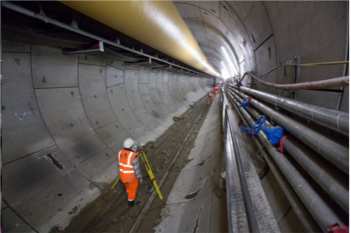An official report has highlighted the role of accountability, trust and transparency in avoiding the kind of management issues recently seen on major projects such as Crossrail and last year’s rail timetabling debacle.
Lessons from transport for the sponsorship of major projects is published jointly by the Department for Transport (DfT) and the Infrastructure and Projects Authority (IPA).

The opening of Crossrail remains a long way off
It ‘identifies lessons and good practice for the sponsorship of major projects from the significant issues experienced with the Northern and Thameslink projects (constituting part of the overall May 2018 rail timetabling changes) and with Crossrail’.
IPA chief executive Matthew Vickerstaff said that while some lessons are more directly applicable to rail and other infrastructure, most are relevant across the Government’s £450bn major project portfolio.
In the foreword to the document, Bernadette Kelly permanent secretary at the DfT, wrote: ‘For me, two points emerge from this work above all. The first is that successful delivery of projects is as much about the interaction of human behaviours – in particular around accountability, trust and transparency – as it is about processes.
‘The second is that major projects of this scale and complexity are inherently difficult so we must constantly challenge ourselves to strive for excellence if we are to deliver for users and taxpayers.’
The report points out: ‘The delivery of the Crossrail, Northern and Thameslink projects experienced issues which meant they have not been delivered to their intended plans or in a way that avoided detriment to current and future passengers. This is despite their extensive governance, reporting and assurance arrangements across the supply chain, delivery organisations, and sponsors.’
It follows the announcement last August that the huge Crossrail project would not meet its scheduled opening date of December 2018. The project is now likely to be delivered around two years late and billions of pounds over budget.
An inquiry by the London Assembly has sought to establish how joint project sponsors the DfT and Transport for London were apparently unaware that the project, which was repeatedly touted as being on time and on budget, was so far behind schedule.
The report identifies 24 lessons under five themes:
(A) Accountability must be unambiguous
(B) Behaviour matters more than process
(C) Control schedule and benefits as well as cost
(D) Deal with systems integration risk
(E) Enter service cautiously
Under the heading: B1.2 ‘Act decisively when in exception’, the report makes another recommendation that appears to relate directly to the Crossrail debacle. London mayor Sadiq Khan said he was told that the project was struggling to meet its opening date but that it was still possible to turn the situation around.
‘Decision makers need to take decisive action when evidence indicates that schedule or cost tolerances will be breached. Assumptions that adverse trends can be recovered or that further analysis will uncover better news are normally unrealistic and they should instead treat the project as being in exception until it is recovered, re-base lined or closed.’
Register now for full access
Register just once to get unrestricted, real-time coverage of the issues and challenges facing UK transport and highways engineers.
Full website content includes the latest news, exclusive commentary from leading industry figures and detailed topical analysis of the highways, transportation, environment and place-shaping sectors.
Use the link below to register your details for full, free access.
Already a registered? Login